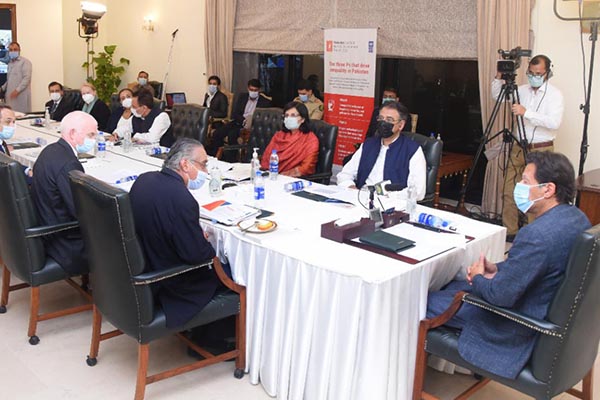
Courtesy PID
In address at launch of UNDP Human Development Report, prime minister reiterates lifting people out of poverty is among government’s topmost concerns
Prime Minister Imran Khan on Tuesday announced plans to approach the International Monetary Fund (IMF) for a fresh COVID-19 relief package, noting that the ongoing third wave of the pandemic had proven disastrous for Pakistan’s services sector.
“We are going to speak to [the] IMF because we see disruptions ahead,” he told a ceremony to launch a United Nations Development Program report on Pakistan’s human development. “Just when our economy was recovering and all the indicators were positive, [we will] unfortunately have to review the whole situation and our new Ehsaas program,” he said, noting that the third wave was proving far more dangerous than the first two.
Referring to the U.S., Khan said that it had distributed $4 trillion to its population of 330 million as part of COVID relief measures. “Pakistan could only distribute $8 billion to its 220 million,” he said—though the U.S. distributed handouts to all citizens, while Pakistan’s was limited to the most deserving and significantly fewer people than its entire population. “I think, this is time for second package and we will obviously talk to IMF,” he added.
According to the prime minister, recent statements by IMF Managing Director Kristalina Georgieva showed she was aware of the seriousness of the situation, adding that people suffering from the pandemic could not endure more pressure. Georgieva had, last month, warned that economic inequality was worsening in many countries due to the pandemic and called for “strong policy action” to enable an equal footing for all countries to recover.
Ending poverty
During his speech, Khan reiterated that civilized societies were defined by how they treated the impoverished and planned to address inequality. Blaming “elite capture” for the problems facing developing nations, he lamented that COVID-19 had worsened the conditions of the impoverished even as the rich remained unaffected.
Referring to a Financial Accountability, Transparency and Integrity Panel report as “shocking,” the prime minister claimed $1 trillion passed out of developing countries annually for tax havens, while $7 trillion was being laundered from poor to rich nations. “This is the reason behind global inequality,” he claimed, adding that money laundering not only increased poverty, but also devalued local currencies and boosted inflation.
Elaborating on the elite capture in Pakistan, Khan claimed the incumbent government had been the first to go after cartels to curb collusion and price fixing. He claimed such cartels had often enjoyed political connections, and claimed the government would strengthen the Competition Commission of Pakistan to address cartelization.
The prime minister said he was proud of the report’s acknowledgment of the reduction in poverty ratio and human development growth in Khyber-Pakhtunkhwa province, despite it being hardest hit by terrorism. He also expressed pride at the transparent disbursement of cash assistance to the needy during the COVID pandemic regardless of political affiliation of the beneficiaries. He hoped the UNDP report would help the government fine-tune its policies to protect the poor.
Referring to an ongoing data collection exercise, he said the database would help the government provide direct subsidies to the most deserving, while ending mass subsidies that “the rich also benefited from.”
In addition to the prime minister, the event was also attended by Planning Minister Asad Umar and the UNDP Regional Director for Asia and the Pacific Kanni Wignaraja. Presented by lead author Hafiz Pasha, the report outlines inequality in Pakistan at both the national and provincial levels.
“The report highlights that interregional inequality in Pakistan has increased. It indicates that the highest level of Human Development in Pakistan is in Sindh, and Khyber Pakhtunkhwa has shown the fastest rate of growth in human development,” said Dr. Hafiz Pasha, lead author of the report. While sharing the key findings of the report, Dr. Pasha highlighted that the level of child development is low in Pakistan, while within Pakistan it is relatively higher in Punjab. He further articulated that the privileges of the elite in Pakistan adds up to PKR 2,660 billion, equivalent to 8% of the GDP.
